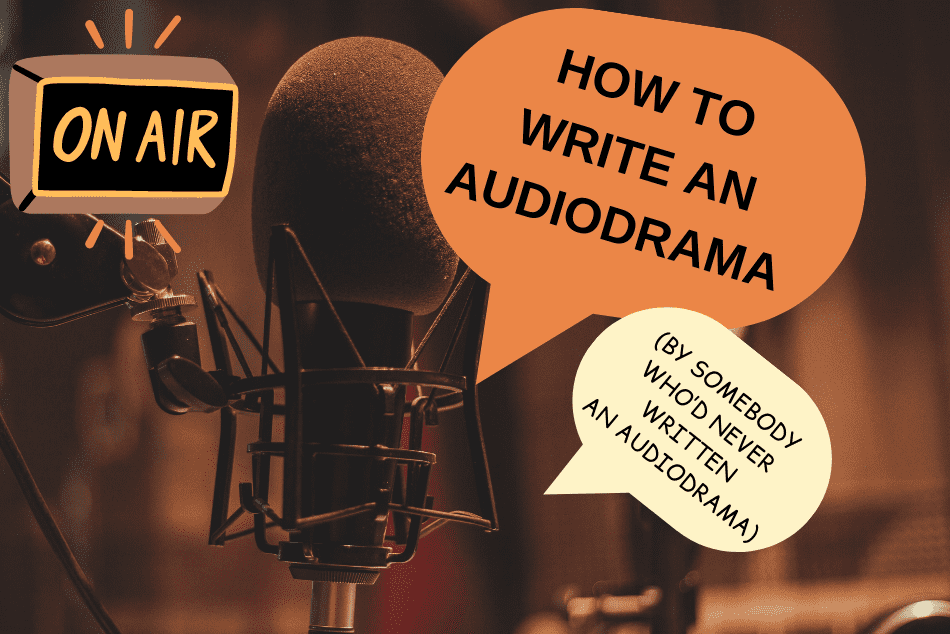WRITING IN A DIFFERENT KEY: A.K.A HOW TO WRITE AN AUDIODRAMA, BY SOMEBODY WHO’D NEVER WRITTEN AN AUDIODRAMA
By Jenna Blum
I’m a fiction writer by trade—I’ve been writing stories ever since I was four years old, when my soundtrack was my TV journalist dad’s typewriter. I started with short stories; worked in food service; wrote a novel; went to grad school for creative writing; sold a different novel than the several I’d previously written; never looked back.
You’d think that after honing my fiction chops, I’d stay with it. As Hemingway said, we’re all apprentices in a field in which nobody is a master. However, I also abide by the advice of another great (if fictional) man, Rhett Butler: “Never pass up new experiences, Scarlett. They enrich the mind.” (I’m aware GWTW has not aged well, but I still love me some Rhett.)
So whenever I’m offered a chance to write in a different key, I jump at it. In my 30s, this meant nonfiction pieces for The Boston Globe: while researching my 2nd novel, I worked as a media tail for a stormchasing company and contributed articles about the big weather safari. During the pandemic, I wrote my first memoir, WOODROW ON THE BENCH, about my beloved black Lab and what the last 7 months of his life taught me—the challenge being emotional vulnerability.
This May, when my friend and Uber-bestselling author Jane Green asked me did I want to write an audiodrama script, a podcast with sound effects, actors, and music like an old-school radio play, I had no idea how to do it. Of course I said YES.
This was some serious-ass bravado. Although I’d written the screenplay for my 1st novel, THOSE WHO SAVE US, I’d never written a podcast. The audiodrama would be a double stretch: a script AND my first historical romance. I’m a #histfic author, but I’d never done romance before. Part of the podcast’s appeal was the chance to sneak into a different genre and give it a whirl without pressure. Kind of like authorial COSPLAY.
Hence THE KEY OF LOVE, which is about a chambermaid with a beautiful voice who, in 1943, is torn between two men, a blue-blooded composer she meets while working at the Fairmont Copley hotel in Boston’s tony Back Bay, and her war photographer fiancé. Her decision affects all three lives and also (cue organ chords!) the course of the war FOREVER. (I snickered the whole time I wrote the treatments for this—a one-sheet description—but I was kinda in love with it, too.)
Here’s part of the treatment:
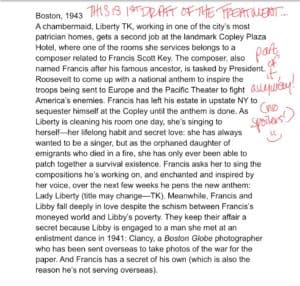
Jane and the production company greenlighted KEY, and voila, my career tributary as an audiodrama writer began.
Here’s how it went down.
I expanded the synopsis above into eight episodes
—-think eight chapters, each with its own internal dramatic arc, each kicking the overall story arc forward. This was a detailed description of what would happen in each episode.
Then I kicked this over to a lovely scriptwriter in L.A.,
…hired by the production company, named Tommy Lombardi. Tommy and I jumped on Zoom to game out each episode: was there enough drama in each? Was there a good cliffhanger? What if we brought in heroine Libby’s fiance Clancy by writing some European war front scenes? What sound effects would we use for that?
Tommy then wrote a rough draft of all the episodes
blocking the drama out into the TWO tools we had available: dialogue and sound effects. That’s it! As a novelist, I’m used to working with a whole palette: detailed description, inner monologue, POV shifts. As a screenwriter, I’d had to lose everything but the dialogue and some description of how characters looked and performed certain actions. As an audio writer, we had only dialogue and sound effects for options. I was VERY grateful to Tommy for boiling our potboiler into these elements.
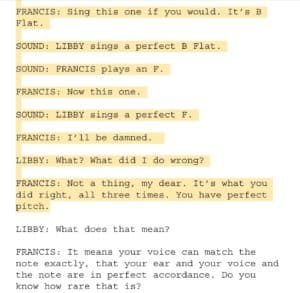
Tommy then gave me the script back and….
I completely rewrote it. Soup to nuts. I needed to make sure it was all in my language, with my understanding of the characters—their conversational tics, their psychology, their arcs.
The producer then read over that draft and said there were some things we’d written that wouldn’t work for podcast. For instance, a montage: in screenplay or novel, you can accomplish this with stage directions or description, but in audio it’s all sound-dependent, so that could be confusing. I had to rewrite some of that action.
Also, some sound effects work…and some don’t. How do you establish, um, intimacy between character without writing, well, audio porn? #Challenge
So I rewrote the script three or four more times.
Tightened it as you would with any work. Then gave it to the production company and, VOILA, magic! They cast it with actors, including the lead, Ruby Rakos, who has the voice of a skylark (which is my protagonist’s nickname from her Norwegian mama). Put in the sound effects—I have NO IDEA HOW.
They composed original music…..and the result? MAGIC.
It is strange enough when you write a book and then meet readers and find your characters and experiences have jumped to their heads, via the magic osmosis called reading. It is a glow-up experience to have your imagination brought to such vivid life by a whole CREW of people—taking the transformation to a collaborative level. Plus, as a lifelong autocrat—as novelists are—I discovered that I actually LOVE working with other people on my writing.
So if you get a chance to transpose your creative ventures into a new key? I’d do it. It’ll open up whole new horizons. And I like to think Rhett Butler would be proud.
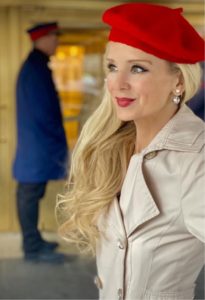
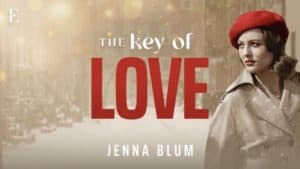 Jenna Blum is the New York Times and internationally bestselling author of Those Who Save Us, The Stormchasers, The Lost Family, and memoir Woodrow on the Bench. She’s one of Oprah’s Top Thirty Women Writers and CEO/ CoFounder of literary digital platform A Mighty Blaze. Listen to Jenna’s audiodrama podcast THE KEY OF LOVE on any major listening platform. New episodes drop every Thursday.
Jenna Blum is the New York Times and internationally bestselling author of Those Who Save Us, The Stormchasers, The Lost Family, and memoir Woodrow on the Bench. She’s one of Oprah’s Top Thirty Women Writers and CEO/ CoFounder of literary digital platform A Mighty Blaze. Listen to Jenna’s audiodrama podcast THE KEY OF LOVE on any major listening platform. New episodes drop every Thursday.

